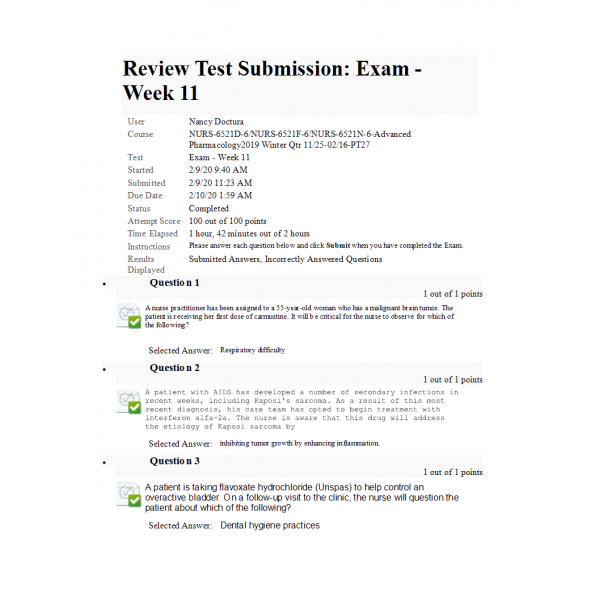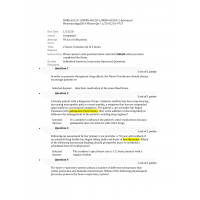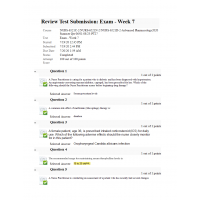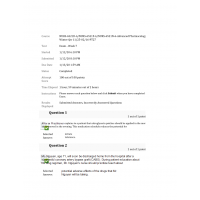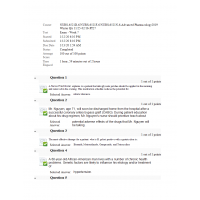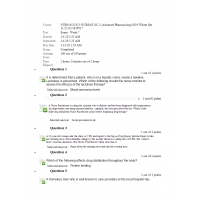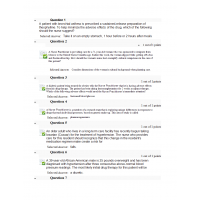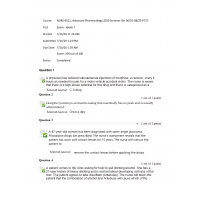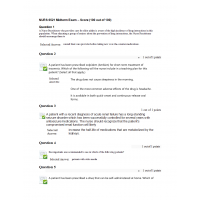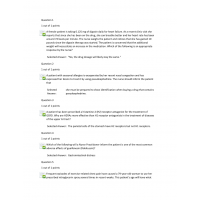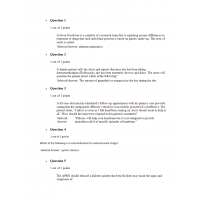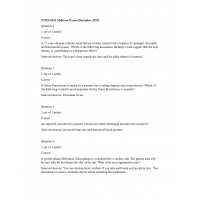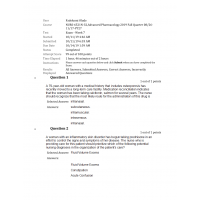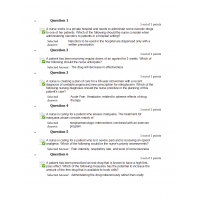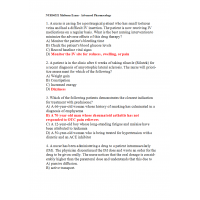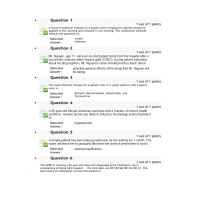NURS 6521D/NURS-6521F-6/NURS-6521N-6-Advanced Pharmacology
Exam - Week 11
100 out of 100 points
- A nurse practitioner has been assigned to a 55-year-old woman who has a malignant brain tumor. The patient is receiving her first dose of carmustine. It will be critical for the nurse to observe for which of the following?
- A patient with AIDS has developed a number of secondary infections in recent weeks, including Kaposi's sarcoma. As a result of this most recent diagnosis, his care team has opted to begin treatment with interferon alfa-2a. The nurse is aware that this drug will address the etiology of Kaposi sarcoma by
- A patient is taking flavoxate hydrochloride (Urispas) to help control an overactive bladder. On a follow-up visit to the clinic, the nurse will question the patient about which of the following?
- A patient is taking etoposide for a testicular tumor refractory to treatment. The nursing assessment reveals that he is also taking warfarin. The nurse must carefully monitor for which of the following?
- A 68-year-old man is being treated for benign prostatic hypertrophy (BPH) and began treatment with finasteride (Proscar) 3 months ago. When planning the care of this patient, what desired outcome should the nurse prioritize?
- A pregnant patient asks the Nurse Practitioner what over-the-counter medication she can take for recurring headaches. The nurse should recommend
- A 29-year-old woman who is morbidly obese has recently begun a comprehensive, medically-supervised program of weight reduction. Prior to adding dextroamphetamine (Dexedrine) to her regimen, the patient should be questioned about her intake of
- A patient has endocarditis and is taking gentamicin. The Nurse Practitioner will be sure to monitor which of the following?
- A Nurse Practitioner is caring for a patient with cancer who has been prescribed dronabinol (Marinol) to help reduce nausea and vomiting from chemotherapy. The nurse will inform the patient that he or she is taking an oral form of
- A 38-year-old pregnant patient admits to the Nurse Practitioner that she is an alcoholic and has been consuming alcohol during her pregnancy. The nurse knows that using alcohol during pregnancy may result in a child who presents with
- A Nurse Practitioner is caring for a 64-year-old female patient who is receiving IV heparin and reports bleeding from her gums. The nurse checks the patient's laboratory test results and finds that she has a very high aPTT. The nurse anticipates that which of the following drugs may be ordered?
- A male patient has been on long-term bicalutamide (Casodex) therapy. In order to assess adverse effects of the drug therapy, the nurse will closely monitor which of the following?
- A patient is receiving radiotherapy for an overactive thyroid gland and asks whether her milk is safe for her baby. If her treatment cannot be discontinued, what should the nurse recommend?
- An immunocompromised cancer patient has developed cryptococcal meningitis and been admitted to the intensive care unit for treatment with amphotericin B. How should the nurse most safely administer this drug?
- A school nurse has been teaching high school students about the risks associated with marijuana use. However, the nurse has been met with considerable skepticism on the part of students, most of whom believe that marijuana is a benign drug. Which of the following teaching points should the nurse provide?
- A Nurse Practitioner is working with a 57-year-old man who is a former intravenous drug abuser. He has been prescribed a weekly dosage of methotrexate for his rheumatoid arthritis. Which of the following will the nurse include in her teaching plan for this patient?
- A Nurse Practitioner is caring for a patient who is on amphotericin B. On morning rounds the patient reports weakness, numbness, and a tingling sensation in his feet. What would be a priority action by the nurse?
- Sulconazole has been prescribed for a patient with tinea pedis. The nurse will instruct the patient to use the topical agent
- An oncology nurse is aware of the risks for injury that exist around the preparation, transportation, and administration of chemotherapeutic agents. In order to reduce these risks of injury, the nurse should take which of the following actions?
- A Nurse Practitioner educator who coordinates the staff education on an oncology unit is conducting an inservice on targeted therapies. What potential benefit of targeted therapies should the nurse highlight in this education session?
- A 5-year-old boy needs an IM injection. The least painful and most effective injection site would be the
- The recommended treatment for trichomoniasis is
- A 15-year-old patient has meningitis caused by Haemophilus influenzae. She is being treated with chloramphenicol. The most important nursing action for this patient would be to monitor
- A 20-year-old woman has been prescribed estrogen. As with all women taking estrogen, the nurse will carefully monitor the patient for which of the following?
- Mr. Singh is a 66-year-old man who is receiving chemotherapy for the treatment of lung cancer that has metastasized to his liver. In an effort to prevent infection, Mr. Singh has been prescribed filgrastim (Neupogen). Which of the nurse's following assessment questions most directly addresses a common adverse effect of filgrastim?
- A postmenopausal patient is prescribed bisphosphonates to treat osteoporosis. The nurse will instruct the patient to take the drug
- Alendronate (Fosamax) is prescribed for a 67-year-old postmenopausal woman. In order to help prevent gastrointestinal distress, the nurse will advise the patient to
- A 16-year-old boy is prescribed cromolyn sodium nasal spray to treat a nasal allergy. To maximize the therapeutic effects of the drug, which of the following will the nurse include in instructions to the patient?
- A 34-year-old male has been diagnosed with TB and will be started on INH therapy. The medication history reveals that he currently takes antacids on a regular basis. The nurse will instruct the patient to take
- A child is admitted to the burn unit with second and third degree burns on both arms and part of his or her face. When administering topical medications to the burned areas, the nurse should
- A 66-year-old man has made an appointment with his primary care provider to discuss his recent erectile dysfunction (ED) and has requested a prescription for tadalafil (Cialis) based on television commercials he has seen. What characteristic of this patient would most likely contraindicate the use of tadalafil for his ED?
- A 39-year-old woman is receiving doxorubicin for the treatment of cancer. After each treatment, the patient has acute nausea and vomiting accompanied by a slightly increased heart rate. The nurse will advise her to
- A nurse practitioner orders a single dose of 2 g Metronidazole orally. How many milligrams will the patient receive in one dose?
- Which of the following would the nurse include in a teaching plan about the signs and symptoms of thrombophlebitis and thromboembolism that should be reported by a patient taking estrogen?
- A 36-year-old woman with a history of dysmenorrhea has begun treatment with progesterone, which she will be receiving by the intramuscular route. The nurse participating in the woman's care should prioritize which of the following potential nursing diagnoses?
- A Nurse Practitioner working in a cancer center is preparing to administer medication to a 5-year-old child. The nurse will calculate the drug dosage by using
- Mr. Laird is a 49-year-old electrician who experienced severe burns on his trunk, arms, and hands in a workplace accident 2 weeks ago. Part of his current wound care regimen involves the daily application of silver sulfadiazine to his wounds. The nurses who are providing care for Mr. Laird in the burns and plastics unit of the hospital should perform what action when administering this medication?
- A 9-year-old boy was bought to his primary care provider by his mother with signs and symptoms of hookworm infection and will be sent home with a prescription for mebendazole. When provided patient and family education, the nurse should teach the mother with which of the following measures to avoid reinfection following treatment?
- A 36-year-old patient comes to the clinic and tells the nurse practitioner that she suspects that she is pregnant. During the initial assessment, the nurse practitioner learns that the patient is currently taking medications for diabetes, hypertension, and a seizure disorder. The nurse would be most concerned about which of the following medications?
- A Nurse Practitioner is caring for a patient who is at 28 weeks' gestation and is receiving terbutaline (Brethine) to control preterm labor. Which of the following assessment parameters should the nurse prioritize?
- A 13-year-old patient has juvenile arthritis. He has recently had oral surgery and was told by the surgeon to take aspirin for the pain. The APRN will monitor for which of the following?
- A pregnant patient who has diabetes has been admitted to the hospital to begin labor. Since the patient has diabetes, the physician has decided to use oxytocin (Pitocin) to initiate labor contractions. When talking to the patient about the adverse effects of the drug, the nurse should understand that the most common adverse effects of the drug include
- The clinical nurse educator who oversees the emergency department in a children's hospital has launched an awareness program aimed at reducing drug errors. What measure addresses the most common cause of incorrect doses in the care of infants and children?
- A patient is receiving cefazolin in combination with anticoagulants. To minimize the adverse effects during therapy, the nurse will
- A 60-year-old patient experienced a sudden onset of chest pain and shortness of breath and was subsequently diagnosed with a pulmonary embolism in the emergency department. The patient has been started on an intravenous heparin infusion. How does this drug achieve therapeutic effect?
- A 29-year-old pregnant patient is extremely upset about having to take medication for a pre-existing medical condition. She is consumed with fear that her baby will be born with a physical deformity or a congenital anomaly but knows that she has to take the medication. She talks constantly about this and is unable to sleep most nights. Which of the following is the most appropriate nursing diagnosis for this patient is?
- Which of the following patients will be at the greatest risk for anemia and would be the most likely candidate for epoetin alfa therapy?
- A 54-year-old woman with a history of osteoporosis has been prescribed ciprofloxacin for recurrent cystitis. Because of the patient's history, the nurse would be sure to discuss with the woman the use of
- A Nurse Practitioner is aware that the concept of selective toxicity is foundational to antimicrobial therapy. Which of the following statements most accurately describes selective toxicity?
- A patient with non-Hodgkin's lymphoma (NHL) will be starting a course of doxorubicin shortly. When planning this patient's care, what nursing diagnosis should the nurse prioritize?
- A Nurse Practitioner is reviewing the prepregnancy medication regimen of a patient who has just had a positive pregnancy test. The nurse should be aware of which of the following changes in pharmacokinetics that accompanies pregnancy?
- A 6-month-old child has developed skin irritation due to an allergic reaction. He has been prescribed a topical skin ointment. The nurse will consider which of the following before administering the drug?
- A Nurse Practitioner is explaining the use of acyclovir therapy to a 72-year-old man. Nephrotoxicity is discussed as a major adverse effect in older patients. To minimize the risk of the patient developing this adverse effect, the nurse will advise him to
- An elderly woman is slated for a hemiarthroplasty (hip replacement surgery) after falling and breaking her hip on the stairs outside her home. The woman's pain in the time since her injury has been severe, and her care team has been treating it with morphine. Which of the following administration schedules is most likely to control the patient's pain?
- A 73-year-old woman has osteoporosis and is prescribed alendronate. She takes calcium and vitamin D supplements, drinks lots of water, and has just quit smoking. The nurse should advise the patient to also
- A 15-year-old boy who has been taking dextroamphetamine for the treatment of ADHD has been experiencing a depressed mood and a sense of hopelessness. He confides in the school nurse that he has begun taking his stepfather's antidepressant to improve his mood. After immediately phoning the boy's stepfather, the nurse learns that the drug in question is phenelzine (Nardil), a monoamine oxidase inhibitor (MAOI). The nurse should recognize that this combination of drugs creates a serious risk of what health problem?
- Drugs have a valid medical use but a high potential for abuse, both psychological and physiologic. In an emergency, a Schedule 2 drug may be prescribed by telephone if a written prescription cannot be provided at the time. However, a written prescription must be provided within 72 hours with the words authorization for emergency dispensing written on the prescription. These prescriptions cannot be refilled. A new prescription must be written each time. Examples include certain amphetamines and barbiturates. This is scheduled drug
- A 59-year-old man with a recent history of erectile dysfunction has been assessed and prescribed sildenafil (Viagra). When providing patient education to this man, the nurse should tell him which of the following?
- A 33-year-old man has developed acute gouty arthritis. He has been prescribed colchicine. When developing a care plan for this patient, which factor will be most important for the nurse to consider?
- A 30-year-old woman who is in the first trimester of pregnancy has presented to her primary care provider with a 4-day history of a reddened, itchy left eye that is crusted with purulent exudate. The clinician suspects a bacterial, rather than viral, etiology. How will the patient's pregnancy affect the potential use of ciprofloxacin to treat her conjunctivitis?
- A 45-year-old female patient is prescribed ciprofloxacin to treat a bronchial infection. A nursing assessment revealed that she started taking daily vitamin supplements about 2 years ago. To maximize the therapeutic effects of the ciprofloxacin therapy, the nurse should advise the patient to
- A Nurse Practitioner is explaining to the parents of a 6-year-old child suffering from angina why nitroglycerin patches for chest pain would not be appropriate. Which of the following will the nurse include in an explanation?
- A Nurse Practitioner is going to administer medication to an infant using a medicine dropper. The best method is to open the child's mouth by gently squeezing the cheeks and placing the drops
- A Nurse Practitioner is providing patient education to a 13-year-old girl who was just diagnosed with type 1 diabetes mellitus. Which of the following statements by the patient will alert the nurse that special instructions regarding insulin are necessary?
- A 7-year-old child has tonsillitis and is prescribed penicillin V, which is to be administered at home. The nurse will instruct the parents to administer the drug
- A patient has been prescribed oral tetracycline. The nurse will instruct the patient to take the drug
- The nurse practitioner orders Amoxicillin 500 mg tid? What is the total amount of medication patient will take per day?
- A Nurse Practitioner will monitor which of the following when assigned to a patient taking allopurinol for chronic gout who visits the clinic every 2 months?
- A female patient is taking filgrastim (Neupogen) to decrease the incidence of infection. The nurse notices a small increase in the neutrophil count 2 days after starting therapy. The nurse's evaluation of the increase is that
- A woman who is in the second trimester of her first pregnancy has been experiencing frequent headaches and has sought advice from her nurse practitioner about safe treatment options. What analgesic can the nurse most safely recommend?
- A Nurse Practitioner who provides care on a pediatric unit of a hospital is aware that the potential for harm as a result of drug errors is higher among infants and children than adults. This fact is primarily due to
- A patient is being seen in the emergency department for a sprained ankle and is given a drug to relieve pain. When a second dose of the pain medication is given, the patient develops redness of the skin, itching, and swelling at the site of injection of the drug. The most likely cause of this response is
- A Nurse Practitioner is to use a single-dose 1 mL vial to administer 0.5 mL of epoetin alfa to a 39-year-old woman who is being treated for chemotherapy-induced anemia. Which of the following will the nurse do with the unused portion of the drug?
- A 20-year-old female patient is receiving topical clindamycin for acne vulgaris. She develops a rash and urticaria along with severe itching where the medication is applied. The nurse will formulate which of the following nursing diagnoses for the patient?
- A 45-year-old woman with acute leukemia is going to begin chemotherapy with vincristine. The nurse is aware that vincristine must always be administered
- Alprostadil (Caverject), a drug used to treat erectile dysfunction, has been prescribed to a 42-year-old patient. When providing education to the patient and his wife, the nurse should inform the wife about which of the following adverse effects?
- A Nurse Practitioner works at a weight management clinic. To which of the following overweight patients could the nurse safely administer dextroamphetamine?
- A Nurse Practitioner is instructing a 19-year-old female patient on the use of fluconazole for candida vaginitis. A teaching priority will be to
- The Nurse Practitioner has established peripheral IV access and begun an infusion of magnesium sulfate on a 29-year-old antepartum patient who is 35 weeks pregnant. Which of the following assessment findings most likely prompted the patient's physician to order magnesium sulfate for this patient?
- An older adult woman has been diagnosed with acute lymphoblastic leukemia (ALL) and her care team has identified potential benefits of imatinib. Which of the following characteristics of this patient's current health status may preclude the use of imatinib?
- Morphine has been prescribed for a 28-year-old man with severe pain due to a back injury. The nurse will advise the patient to avoid
- A male patient has been brought to the emergency department during an episode of status epilepticus. Diazepam is to be administered intravenously. The APRN will be sure to
- After 6 months of unsuccessfully trying to conceive, a 31-year-old woman and her husband have sought a referral to a fertility specialist in order to explore their options. A nurse at the clinic should recognize that the woman may benefit from
- A patient has been admitted to the critical care unit with a diagnosis of peritonitis that has necessitated treatment with gentamicin. As a result, the care team should be cautious when concurrently administering other medications that may cause
- A Nurse Practitioner is assigned to a patient who is at 32 weeks' gestation and is receiving terbutaline (Brethine) IV for 24 hours to control preterm labor. Which of the following nursing actions will the nurse take to decrease the risk of hypotension and promote circulation to the fetus?
- Laboratory testing has confirmed that a patient has chloroquine-resistant malaria and the patient's physician has prescribed quinine along with an adjunctive drug. The nurse should question the physician's order if the patient has a history of
- A 20-year-old woman will soon begin taking oral contraceptives for the first time. What advice should the nurse provide to this patient?
- A 30-year-old African-American woman tested positive for TB and is prescribed isoniazid. The nurse will plan the patient's care to include close monitoring of the drug therapy because
- A 66-year-old woman has experienced a significant decline in her quality of life as a result of worsening rheumatoid arthritis. Her physician has prescribed etanercept and the APRN is responsible for facilitating this new aspect of the patient's drug regimen. This will involve the administration of
- A patient with a recent diagnosis of chronic myelogenous leukemia (CML) is discussing treatment options with his care team. What aspect of the patient's condition would contraindicate the use of cyclophosphamide for the treatment of leukemia?
- When planning care for a patient who is receiving filgrastim (Neupogen) for a nonmyeloid malignancy, the nurse should formulate which of the following patient outcomes? (Select all that apply.)
- A Nurse Practitioner who provides care on a pediatric medicine unit has conducted a medication reconciliation of a recently-admitted patient. In light of the fact that the child takes methylphenidate (Ritalin), the nurse is justified in considering a history of what health problem?
- A female patient is taking oral cyclophosphamide therapy for breast cancer. Because of possible adverse effects of the drug, the nurse will instruct the patient to do which of the following?
- The nurse recognizes that the potential for teratogenic drug effects is not static throughout the prenatal and postnatal periods. The potential for teratogenic effects is highest during
- A Nurse Practitioner is working with a 16-year-old pregnant teen and assessing for behavior that may put the baby at risk. The most important assessment the nurse can make is
- A patient has acquired primary hypogonadism and has been prescribed testosterone transdermal (Androderm) patches. When educating the patient on how to administer the drug, the nurse will instruct him to
- A Nurse Practitioner is assessing a patient who has chronic lymphoblastic myelogenous leukemia. The treatment plan includes hydroxyurea (Hydrea). The nurse will assess the patient for which of the following?
- A patient is to begin taking tobramycin (Nebcin) for a nosocomial infection. Which of the following assessments should the nurse prioritize?
- A Nurse Practitioner is caring for a 10-year-old boy who complains of chronic headaches. His mother reports that she gives him Tylenol at least three times a day. Which of the following will the nurse work with the physician to evaluate?
A patient is receiving long-term clindamycin therapy for a life-threatening infection. The nurse will begin by monitoring this drug therapy by obtaining
| Institution & Term/Date | |
| Term/Date | Walden University |
NURS 6521D Week 11 Final Exam
- Product Code: 2022
- Availability: In Stock
-
$40.00

